I love multiverse stories, and the concepts of parallel universes, mirror worlds, quantum immortality, and alternate realities have popped up in my own fiction since I started writing as a little kid. I like wild and far-ranging multiverse stories, but I also love the smaller and more personal ones, where the concept is used to explore the ramifications of making different choices—even little changes can lead to vastly different outcomes in your life. We may actually inhabit a multiverse, but we only get to live in one timeline at once, and every door we step through means leaving others closed forever.
I just published the second book in a duology (Doors of Sleep and Prison of Sleep) that is by far my most multiverse-y thing ever: it’s about someone who wakes up every day in a new universe, and a big part of the fun of the series was coming up with scores of bizarre new worlds for him to explore, from the nightmarish to the sublime. And so I was thinking about the books and stories that got me hooked on the concept of the multiverse in the first place, and the ones that expanded my idea of what multiverse stories could accomplish, and I wanted to take you on a little tour through my literary influences and later favorites. (Only five books, but I could have done fifty. In other worlds, I’m sure I chose different books.)
The Talisman by Stephen King and Peter Straub
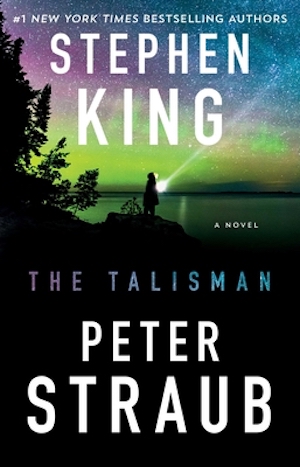
Twelve-year-old Jack Sawyer’s mother is dying of cancer in a crumbling East Coast hotel when Jack meets a strange old man at an amusement park. The man tells him there’s a way to save her life: go on a quest across the country, and across realities, to obtain the Talisman. During the course of his journey, Jack has to “flip” back and forth between the long roads of the United States and a parallel universe, The Territories, a magical version of North America populated by monsters, mutants, wolf-people, and “twinners” of some people in our reality—his mother, for instance, is a queen over there, and she’s dying, too. This is a long, weird, occasionally heartwarming (but mostly heart-wrenching) coming-of-age story, as Jack proceeds along the “road of trials,” making allies and enemies along the way. The most mind-blowing part comes at the very end, when Jack begins to flip rapidly through alternate realities, revealing that our world and the Territories are just two of a possibly infinite number of possible realities. (King went on to explore that idea alone in his multiverse epic Dark Tower series.)
Lost Futures by Lisa Tuttle
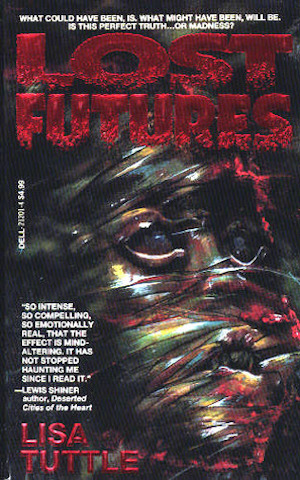
In the early ‘90s, Dell had a horror imprint called Abyss that published innovative dark fiction by some of the brightest new talents in the field, producing about 50 titles, many of them now acknowledged classics. I picked up Lost Futures from a drug store paperback spinner rack as a teen, expecting blood and monsters, and instead I got a meditative, sorrowful look at how our choices define us. The protagonist Clare is in her thirties, working as an accountant, grief-stricken over her dead brother, and miserable about her life. She begins to think about paths not taken, and where she could have ended up if she’d made different choices… and she begins to travel to those alternate timelines, seeing how things might have worked out (or, more often, gone wrong in different ways). Things get worse when an alternate version of Clare thinks our protagonist’s boring little life looks pretty appealing, and tries to take her place. It’s not a book I hear talked about often anymore, but it was a finalist for the Clarke Award and the Tiptree, and it’s compelling, sad, and worth a look.
Imajica by Clive Barker
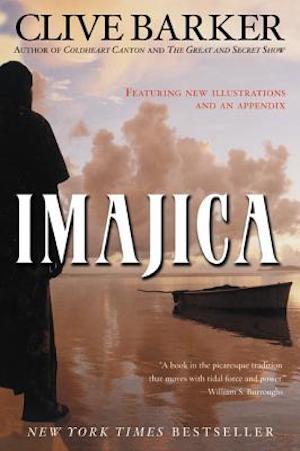
I could write another essay called “I Was A Teenage Horror Fan,” and I got into Clive Barker when my aunt gave me the first three volumes of the Books of Blood. I eagerly read everything he wrote, and while I also loved his portal fantasy Weaveworld, it was Imajica that really blew my mind. It’s not horror, though it has horrific bits; it’s a vast, sprawling, philosophical tale about an artist named Gentle who discovers that Earth is just one of five “Dominions”. Each is more bizarre than the last, accessible by those with magical knowledge. Gentle journeys through the Dominions in a quest to discover his own history and to find the Unbeheld—God, basically. Along the way there are frozen seas, inverted cities, non-human sapients, and truly weird magic. It is, admittedly, an uneven book, and probably too long, but it’s unlike any other novel, and jammed full of world-hopping wonders.
Brasyl by Ian McDonald
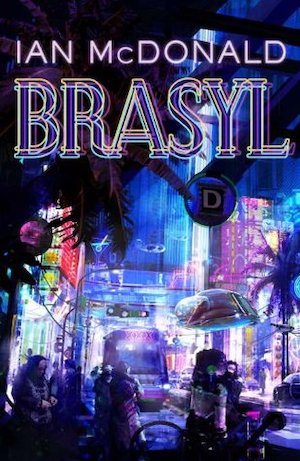
Moving into the current century, there are heaps of newer multiverse books I adore. One of the best and most ambitious is Ian McDonald’s Brasyl. It takes place in three separate timelines, all in richly detailed versions of Brazil: one in 2006, one in 2032, and one in 1732. As if those different times aren’t enough, there are also different realities, and eventually the explicit revelation that each reality is just one of many possibilities. (My favorite part involves a Jesuit priest in the 1700s who takes a hallucinogen that gives him visions of the multiverse.) The 2032 strand has a modern cyberpunk vibe, with quantum computing on the rise, leading to unexpected applications that shatter the characters’ understanding of the nature of reality…. and might expand your own.
The Ten Thousand Doors of January by Alix E. Harrow
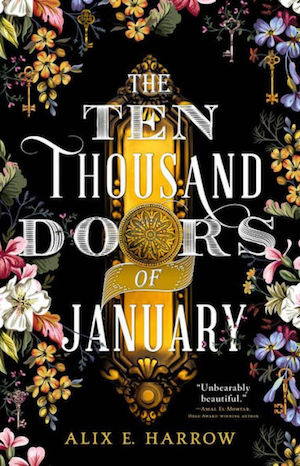
I’ve enjoyed Harrow’s writing since her Hugo Award-winning story “A Witch’s Guide to Escape: A Practical Compendium of Portal Fantasies” (which, as the title suggests, is also about other worlds), and snapped up her debut novel The Ten Thousand Doors of January as soon as it came out. Imagine my delight when I discovered it’s about the exploration of alternate realities, and my even greater delight over the fact that it’s about actual magical doorways to other worlds: I unabashedly love the magic door trope, from Stephen King’s The Drawing of the Three to the weird SyFy Channel mini-series The Lost Room. This is the tale of January Scaller, a young woman who discovers a book (The Ten Thousand Doors) about travel to other worlds—and soon learns it’s not fiction, but a true account. January goes searching for those doors, looking for adventure, but she also learns about her own surprising origins, and the truth about her mysterious family. It’s a beautiful novel, moving and breathtaking.
***
That’s my five books, but here’s a little bonus recommendation: Caitlín R. Kiernan’s 2001 story “Onion” is a haunting, chilling tale about a support group for people who’ve glimpsed other realities, and had their lives changed forever in the process. I read it 20 years ago, and I still think about it all the time.
Buy the Book
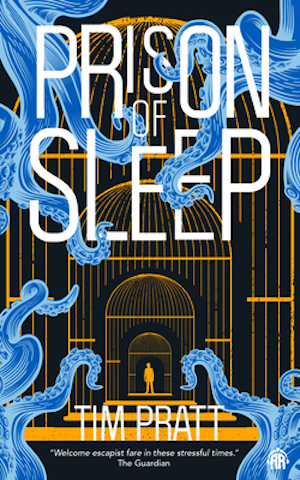

Prison of Sleep
Tim Pratt is a Hugo Award-winning SF and fantasy author, who has also been a finalist for World Fantasy, Sturgeon, Stoker, Mythopoeic, and Nebula Awards, among others. Since 2001 he has worked for Locus, the magazine of the science fiction and fantasy field, where he currently serves as senior editor. He lives in Berkeley, California, with his wife and son.










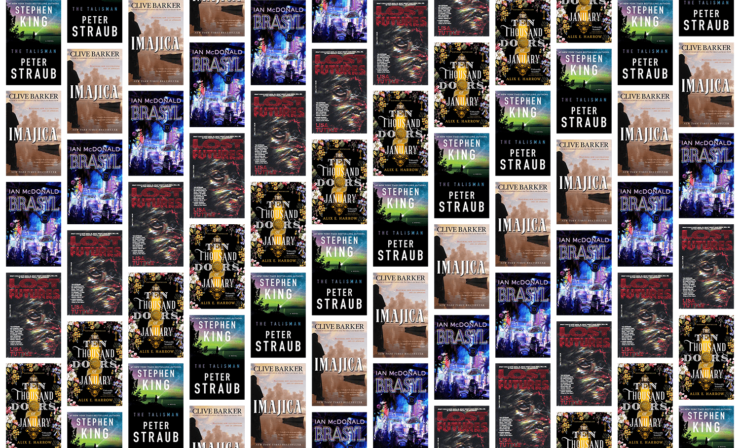
My suggestions:
The Chronicles of Amber by Roger Zelazny
Glory Road, by Robert Heinlein (although most of his “World as Myth” books qualify).
And, from the old Faction Paradox line, Lance Parkin’s Warlords of Utopia
I agree with @1 DigiCom, Zelazny’s Amber tales are a glorious romp through the ripples of a multiverse. Loads of fun. The original list here offers some new stuff for me as well; looking forward to reading Imajica now.
More seriously and more recent, I really want to bring up The Doors of Eden by Adrian Tchaikovsky (2020): a Nantucket Sleighride through a multiverse branching at major evolutionary turning points. I could not put that big-ol’ book down.
How about Kameron Hurley’s trilogy The Worldbreaker Saga? (The Mirror Empire, Empire Ascendant, and The Broken Heavens.) During a grand conjunction of multiverses that can lay waste to civilizations and reshape continents, a conquering nation in one multiverse discovers that they can invade another…so long as their counterpart in that universe is dead. Long games, genocide, disasters, and more emotional weight than you could shake a stick at.
Don’t forget Neal Stephenson’s Anathem, which (spoiler alert) is very explicitly about the multiverse, complete with mathematics and cosmology.
A discussion of sf multiverses is incomplete without mention of Michael Moorcock’s work. For decades I hardly ever heard the word “multiverse” except in conjunction with his Eternal Champion stories. It’s everywhere now, of course, but his influence is probably the reason why (although, as he admitted, he didn’t coin the word.. On the other hand, he might have invented it independently.)
Dark Matter by Blake Crouch
Digicom’s mention of “Glory Road” by R.A.H. is one I hadn’t thought of although it certainly qualifies as well as “The Cat Who Walks Through Walls”. But then I was reminded of the Pratchett/Baxter series “The Long Earth”. Which led me to Tad William’s “Otherland”. While, strictly speaking, may not be “multi-verse” in the physical sense certainly had a plethora of cyber-vironments of the virtual kind. Greg Bear’s “Eon” had “The Way” with its infinite geometry stacks that led to various worlds. So I guess the concept can be approached in a variety of ways if one is willing to stretch the ole imagination. Oh, and lest I forget there was “Wildside” by Steven Gould. Good stuff all.
Imajica is not a book I’d have classified as a multiverse novel but that doesn’t matter. It is an awesome story and deserves to be better known!
I also don’t think it was too long. It is long, in fact massive, but I enjoyed every page of it.
See also The Wheels of If by L. Sprague de Camp. The protagonist is involuntarily shifted through several alternate worlds, such as one where the USA remained a British colony, one where Napoleonic France conquered the world, and several others that were just “different” until finally ending up in one where the Viking settlement of Vinland became permanent, the Norman Conquest never happened, and North America is now part of a sort of Scandinavian-Celtic “union.”
I just finished The 22 Murders of Madison May by Max Berry. Very much in the multiple realities lane and pretty good on the whole. Far less about the worlds themselves, and much more about a woman who finds herself traveling between them, trying to stop a serial killer. I’d recommend it.
@7 Then there’s Tad Williams’s The War of the Flowers which has at least two worlds, our modern Earth and the world of Faerie. Maybe not multiverse but we’re getting there.
A few new additions to the multiverse list:
“This is How You Lose the Time War” by Amal El-Mohtar and Max Gladstone – two time-agents from warring timelines keep (en)countering each other
“The Midnight Library” by Matt Haig – a dying woman has a chance to visit multiple versions of her life
“The Space Between Worlds” by Micaiah Johnson – you can travel to an alternate universe only if your alternate-self is dead there.
Brasyl is outstanding, as is everything that McDonald writes.
Frederik Pohl wrote The Coming of the Quantum Cats. It explored the multiverse and the consequences of too much travel between worlds.
H. Beam Piper’s Paratime stories certainly count.
Lost Futures in OPENBOOKS Jo Walton’s My Real Children has three different worlds..actually brought me back to SFF after thirty year hiatus.Now have shelfloads but LOVE multiverse stories.
Jo Walton’s My Real Children has three different worlds..actually brought me back to SFF after thirty year hiatus.Now have shelfloads but LOVE multiverse stories.
Check out r/shiftingrealities on Reddit. Many people have encountered such experiences, shifting between solid 3D realities which are not lucid dreams, but everything seems as real as here.